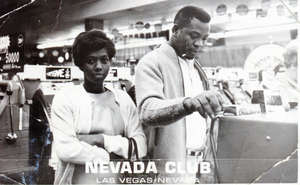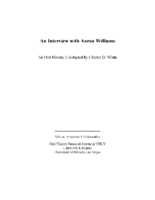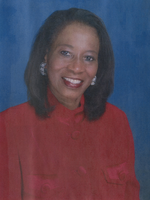Search the Special Collections and Archives Portal
Search Results
Morse Arberry oral history interview
Identifier
Abstract
Oral history interview with Morse Arberry conducted by Brittany Thompson and Andrew Thomas on November 20, 2015 for the African Americans in Las Vegas: a Collaborative Oral History Project. In this interview, Arberry discusses his personal history and moving to Las Vegas, Nevada in 1958. He talks about his father's employment at the Nevada Test Site and the issues of segregation at the time. Arberry recalls attending the Westside School and talks about school integration. He then describes his career in legislation, working on bills to improve the integration process, and the impact that the University of Nevada, Las Vegas (UNLV) had on the level of education among adults in the community. Lastly, Arberry discusses the West Las Vegas community, the significance that religion had on African Americans, and the increase of law enforcement in the area.
Archival Collection

Photograph of Dell Ray Rhodes with her husband at the Nevada Club, 1965
Date
Archival Collection
Description
Dell Ray Rhodes with her husband, Charles Freeman, in 1965.
Image
Barbara Cole oral history interview
Identifier
Abstract
Oral history interview with Barbara Cole conducted by Claytee D. White on June 29, 2005 for the the African Americans in Las Vegas: a Collaborative Oral History Project. In this interview, Barbara Cole talks about the history of African Americans in Las Vegas, Nevada previous to the 1950s. She discusses her early childhood and her large family, as well as the family's contributions to the community. Barbara shares her thoughts on the race relations in Las Vegas throughout her life and details some of her own personal experiences with it. She also shares her knowledge of the foundation of Las Vegas' Westside.
Archival Collection
James H. Rainey, Sr. and Veronica Ross oral history interview
Identifier
Abstract
Oral history interview with James H. Rainey, Sr. and Veronica Ross conducted by Claytee D. White on March 12, 2012 for the African Americans in Las Vegas: a Collaborative Oral History Project. James H. Rainey, Sr. discusses his summers working in Las Vegas, Nevada before moving from Arkansas in 1961, as well as his work at the Nevada Test Site. Veronica Ross, his niece, talks of moving to Las Vegas in 1965 and her experiences growing up. Details are given on their recent family history as well as the budding African American community and lifestyles during the 1960s and 1970s in Las Vegas.
Archival Collection

Transcript of interview with Aaron Williams by Claytee D. White, August 16, 2005
Date
Archival Collection
Description
Aaron Williams moved to Las Vegas in 1960 and worked at the Nevada Test Site before serving as North Las Vegas councilman, County Commissioner and community activist. Williams sponsored youth baseball teams in North Las Vegas.
Text
Melvin Sanders Jr. oral history interview
Identifier
Abstract
Oral history interview with Melvin Sanders Jr. conducted by John Grygo on February 18, 2013 for the African Americans in Las Vegas: a Collaborative Oral History Project. In this interview, Sanders discusses his personal history and his experiences growing up in Las Vegas, Nevada. He describes the development of West Las Vegas, his father being a pastor at the House of Holiness church, and talks about other spiritual leaders in the community. Later, Sanders discusses the riots after the assassination of Martin Luther King Jr. and how African American entertainers were limited in where they performed on the Las Vegas Strip. He talks about Jackson Street, the increase of police on the Westside, and racial tensions in the mid 1970s. Lastly, Sanders recalls when casinos begun integrating, and he describes starting an automobile detailing business, J.R. Detailing.
Archival Collection

Photograph of Debbie Conway, circa 2006
Date
Archival Collection
Description
Color portrait photograph of Debbie Conway.
Image
Greta Peay oral history interview
Identifier
Abstract
Oral history interview with Greta Peay conducted by Kali Woods on November 11, 2015 for the African Americans in Las Vegas: a Collaborative Oral History Project. Peay, a school administrator with the Clark County School District (CCSD) discusses Las Vegas education experiences in Nevada that are relevant to racial inequities across the country. Peay also comments on studies that show Nevada schools at the bottom of national rankings when comparing Black graduation rates, the school-to-prison pipeline, and low enrollment in college-prep courses for Black high-school students.
Archival Collection
Barbara Bates Kirkland oral history interview
Identifier
Abstract
Oral history interview with Barbara Bates Kirkland conducted by Claytee D. White on November 12, 2004 for the African Americans in Las Vegas: a Collaborative Oral History Project. Kirkland discusses working at the Westside School with Mabel Hoggard and co-founding the La Femme Douze.
Archival Collection
Lonnie Pittman oral history interview
Identifier
Abstract
Oral history interview with Lonnie Pittman conducted by Beverly Williams on March 16, 1981 for the Ralph Roske Oral History Project on Early Las Vegas. In this interview, Pittman, an African American man, describes the treatment and living conditions of African Americans in Las Vegas, Nevada during the 1950s. Pittman also discusses the job opportunities available to African Americans, segregation, and the quality of schooling available to African American children at the time.
Archival Collection
